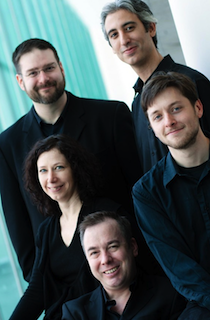
The San Francisco Early Music Society presents the West Coast debut of the acclaimed chamber group Quicksilver, called "rock stars within the early music-scene." The Huffington Post named Quicksilver's 2011 recording, Stile Moderno: New Music from the Seventeenth Century Breakthrough Album of the Year.
During a busy weekend, Feb. 28-March 2, Quicksilver performs The Early Moderns in Palo Alto, Berkeley, and San Francisco. The concerts explore strange and extravagant trio sonatas and related music from 17th-century Italy and Germany.
Quicksilver is co-directed by violinists Robert Mealy and Julie Andrijeski, with Greg Ingles, trombone; Dominic Teresi, dulcian; David Morris, cello and viola da gamba; Charles Weaver, theorbo and guitar; and Avi Stein, organ and harpsichord.
Quicksilver focuses on what it calls the revolutionary new music and musical forms that developed during the first two generations of the Baroque era:
Among the most influential musical inventions of the period was the sonata: a pure instrumental work, a piece simply meant to be "sounded," with no agenda but the imagination of the composer, and no standard form other than the passionate give-and-take of friends in conversation.
Quicksilver's program includes sonatas by Italians Dario Castello, Giovanni Battista Fontana, and Biagio Marini; Germans Johann Kaspar Kerll and Matthias Weckmann.
Also included: an example of the canzona by Johann Vierdanck (1605-1646), one of Heinrich Schütz's most talented students. The canzona was a late Renaissance form that preceded the sonata, and Vierdanck uses syncopated dance rhythms to create a festive atmosphere. The three Bay Area concerts will have varying programs.

